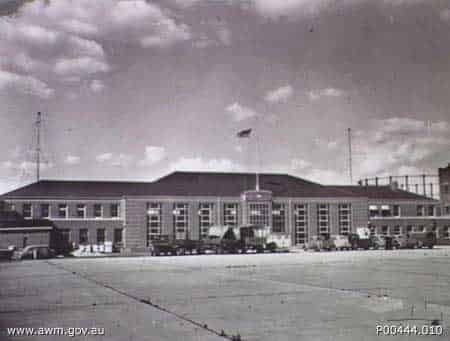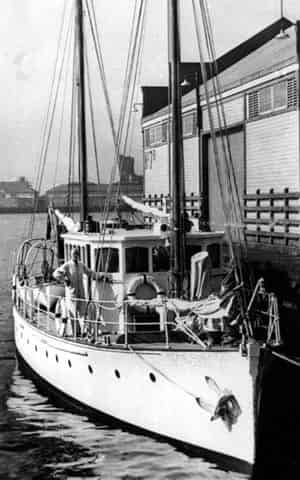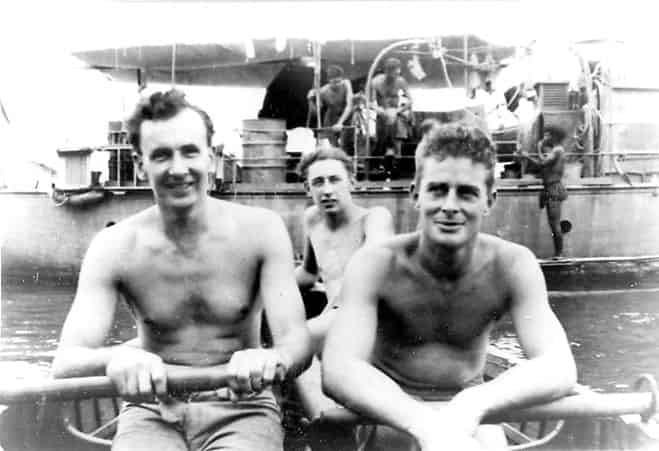The Navy
Biography
1912-1929Childhood
The Bank
1930-1939
Adolesence
Marriage
1940-1949
The Navy
First Buildings
Bohemian Associations
1950-1959
Early Houses
Margot
Professional Building
1960-1969
Hard Times
Knox House
Landscape Architecture
1970-1979
Helping Hand
Eltham Shire Council
Mature Houses
1980-1986
Postscript
The bank continued its personal war against Japanese aggression by refusing to release any of its protected employees to join the armed forces. In 1942 I realised for the first time just how useless I felt: I was counting pennies in the bank at Preston while the enemy was holding victory marches in Melbourne.
Alistair applied to enlist in the Naval Auxiliary Patrol (NAP), the bank refused permission for him to leave but was overridden by the Navy Office. The NAP was concerned with small vessels - converted peacetime-auxiliary yacht from forty to eighty feet in length with a crew of about five.
 HMAS LondaleThe Naval Heritage Foundation of Australia Inc.
HMAS LondaleThe Naval Heritage Foundation of Australia Inc.We all found the three months initial training fascinating. The Seamanship Manual, Volume 1, became our bible, and all around us the most familiar objects became part of a ship. We slept in hammocks hung high up in the mess decks over which we lived; this gave us a new dimension of tidy homeliness which we greatly appreciated. 'The floor' became 'the deck', and 'the ceiling' the 'deck head'. The 'door' which led to and from the depot to the street was the 'gangway'; we saluted it every time we came 'aboard', in memory of Admiral Nelson. We caught the liberty boat every time we went ashore even though it only opened onto Rouse Street, Port Melbourne.
After completing his preliminary training he was transferred to Williamstown and drafted onto HMAS Nordecia doing Outer Harbour Patrols. In reality the patrol was a useless procedure - except for training in proper seamanship - and its excitement soon palled. Its major advantage to me was that no matter how cold, wet, or inconvenient it may have been at times, it was so much better than the bank.
After I spent the better part of a year instructing in motor engines and cleaning mess decks - interspersed with a stint of watch-keeping - the great draft arrived. Six Victorian ratings were to be drafted onto HMAS Martindale to head for New Guinea despite the fact that most of that zone had already been cleared of Japanese. I knew I was going as 'engineer' and that my bank colleague Don Deany would also be coming.
 The Martindale in the 1930s
The Martindale in the 1930sHMAS Martindale was an auxiliary yacht of sixty-six-foot length which had been built for a millionaire grazier. Its hull was jarrah with teak decks and fiddleback blackwood fitting. When I first saw her flared bow, cruiser stern, and flush decks complete with two fourteen-foot dinghies, I was simultaneously excited and nonplussed. I thought she would have been bigger
The greatest night of my sea career followed the day we left Port Adelaide after the commissioning and benediction by the local commander of the NAP fleet. The first thing I recall thinking as we proceeded out into the teeth of an angry southern ocean reinforced by a gale-force westerly from the roaring 'forties was the firm belief that our time on earth was about to come to a sudden end. As I think back, I can distinctly taste the fried onions of my departing dinner as they went overboard towards evening.
<1>Sea-sickness continued, the diesel engine, which was Alistair's responsibility, failed. All in all not a good night but they made Williamstown and berthed at Gem Pier before heading to Sydney for a refit. Then on up the coast to Townsville and Cairns, where they were confined for a week by a cyclone.
At Milne Bay where they were quickly introduced to the real theatre of operations - the 'trade war'.
Trade had already become our main topic of conversation, and it was decided that those odd crew members who hoped to make a killing with a few odd packets of needles and the like trade them privately, but that from henceforth the Martindale Trading Company (No Liability) be formed and that we all work unitedly to a common end. George immediately came into his own. As an insurance agent, he could name all the strategies and set out all the targets. Our combined efforts got off to a wonderful start when, with much trepidation, we were persuaded to buy some boxes of betel nut to sell in the Trobriands by some RAF personnel who could not get there themselves. Contact was made with a chieftain, and some of the crew set out at night to trade. The price was set at twopence a nut, and in less than three hours our supplies were exhausted and over 100 pounds had been made - a sum beyond our imagining. We now saw the war in a very different light. Our great advantage was our continual movement at sea within a short circuit. It kept us in frequent communication with the wealthy Americans and the natives with whom they had been dealing. In a short time, we would become a junior 'McHale's Navy'. We didn't carry torpedoes like that infamous P.T. boat of TV fame, but all other social and wartime opportunities were there.
 Foreground L to R Don Deasey, Alistair Knox with the Martindale in the background
Foreground L to R Don Deasey, Alistair Knox with the Martindale in the backgroundThe skipper's great navigational skills were called into play as we threaded our way through narrow waters in order to gain a few hours for indulging in our illegal trading passion. I fitted an auxiliary engine we found on a tip to the second dinghy that already had a mounting and the other requirements necessary for this new form of adventure. We would study our charts to locate native villages on the coast, and then send our No. 1 trader George Sangster and one of the other crew members off for the day while we did our legitimate jobs. We would locate our position by using visual natural features on adjacent islands, and then leave them to their trading fate.
The dinghy was always set ready for business. It could be lowered at a moment's notice. A drum of kerosene, taken from the ship's supplies and fitted with a tap, was applied on the bow for easy distribution. Amidships was a wide variety of goods arranged in boxes designed to attract the local inhabitants intent on turning their American dollars into useable commodities. The Papuans had not yet fully learnt the power of the greenback and when we first offered cigarettes, flour, rice, meat, and vegetables and all the other goods we negotiated from stores, they were hesitant. Our personal embarrassment was the great quantities of silver we acquired and found it hard to dispose of. George hit on the idea of changing their notes into silver, and immediately we found ourselves with a dwindled silver supply and an increasing bundle of pounds and dollars that always smelt of natives and palm oil. Then they would begin to trade, and we would sail away with both the notes and the silver. Every third or fourth day, we would hold a directors' meeting to declare a dividend.
It was a long way from the bank and an idyllic change. However this couldn't last forever and a couple of years later increasing ill health saw him declared unfit and embark on an adventurous trip home.
The Navy had changed him making it seem impossible to return to the bank. Meanwhile life in Melbourne had also moved on. A new chapter was opening.
